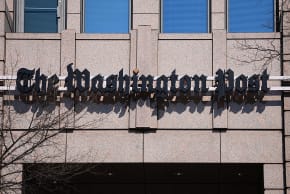Journalism
Russian-Israeli journalist removed from Netanyahu's US flight amid 'security concerns'
Security officials decided to revoke Nick Kolyohin's inclusion in the prime minister's flight to Washington due to security concerns "that cannot be detailed at this moment," the PMO said.


Jerusalem journalist arrested after reporting suspected Iranian recruitment attempt

Editor's Notes: Washington Post chose comfort over survival, now journalists pay price - comment

Washington Post begins widespread layoffs, sharply shrinking storied newspaper's reach
Israel's Army Radio was an exception to the global military broadcasting standard - comment
Many democracies do have military broadcasting, but it is typically aimed at serving troops, often overseas, not operating as a mainstream competitor in the domestic news ecosystem.

FPA welcomes Israel's High Court move to curb delays on journalists' entry to Gaza
The FPA has repeatedly requested access to Gaza since June, but permission was denied by the state, citing security concerns.

'Not used to this': Sydney editor describes newsroom shock
Ben English, editor-in-chief of the Daily Telegraph, described a city and a staff running on adrenaline, confronting a type of violence many Australians never expected to see on their own shoreline.

How is Iran responding to the attack on Jews in Australia? - analysis
After the Bondi Beach mass murder, Iranian state media avoided praise but sought to link the antisemitic attack to the Gaza war, while pro-Iran commentators justified the killings.

Danielle ‘Chava’ Greyman-Kennard: Proving the haters wrong – and saving animals while doing it
Behind the Bylines: Having worked at the 'Post' for several years now, Chava is known for her determination and fearlessness to stand up for what’s right, which has served her well in journalism.

‘The Jerusalem Post’: Marking 93 years of influential journalism – Part 1
To celebrate the Post’s anniversary on December 1, several of our reporters have shared the articles they believe left the strongest mark on public conversation, policy, society, and more.

Israel’s media has not learned the lessons of the October 7 massacre - opinion
Israel’s media continues to repeat IDF claims without scrutiny, and after the October 7 massacre, that failure is dangerous.

Editor's Notes: Death of American Jewish media leaving dangerous void - comment
Isn’t it absurd that we at The Jerusalem Post often have more readers in the United States than many local Jewish outlets that are physically based there?

US lawmakers say Israel hasn't held to account those involved in 2023 strike that killed journalist
US lawmakers accuse Israel of failing to investigate the October 2023 attack on journalists in Lebanon, which killed Reuters reporter Issam Abdallah and wounded others.

Some 60% of journalists killed in Gaza were part of terrorist organizations - study
“The issue of Hamas’s propaganda is a high priority, and it uses a lot of media outlets abroad to talk about it,” said Shlomo Mofaz.
